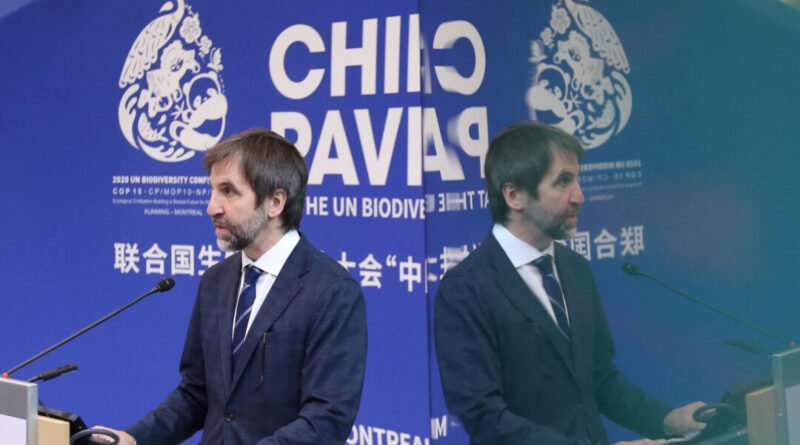Canada and the West Target Net-Zero by 2050, While Beijing Pursues Global Dominance by 2049: A Remarkable Coincidence
News Analysis
For some observers, Canada’s and other Western countries’ steps toward net-zero emissions by 2050 and the impacts on their economies and way of life have one main beneficiary—the Chinese Communist Party (CCP)—which its leader Xi Jinping has said is aiming for dominance in “national strength and international influence” within the same timeline, 2049.
“I think there’s a remarkable coincidence between China having its eyes on 2049, the 100-year anniversary of the CCP takeover, as the date at which they want to solidify their position as the sole global superpower, and the rest of the world having embraced this notion of net-zero by 2050,” Ross McKitrick, an economics professor at the University of Guelph, told The Epoch Times.
“These two big programs, one in the West and one in China, both end up with the same outcome. But in the West, it’s astonishing, because it’s self-inflicted.”
David Leis, vice-president of the Winnipeg-based Frontier Centre for Public Policy, says such episodes show that Western governments are taking measures detrimental to their nations’ well-being while China seeks to strengthen its status as a dominant power.
“What this does ultimately is undermine our future prosperity,” Mr. Leis told The Epoch Times.
While China is building cross-border energy pipelines, oil tanker routes, and highways via its trillion-dollar Belt and Road Initiative, Canada, due to domestic and U.S. policies, is losing major pipeline projects including the Energy East and Keystone XL pipelines, oil tanker routes (Bill C-48), and now, major road projects, if Mr. Guilbeault’s words are any indication.
embroiled in a legal fight with the provinces to classify plastic products as toxic.
Ottawa’s $5,000 EV consumer incentive, as part of its policy to phase out gas-powered vehicles, will be lining the pockets of firms that manufacture in China and sell to Canada, since the scheme doesn’t have a local-manufacturing requirement.
livelihood of communities
built around coal mines in the process, China is ramping up its coal generation.
The Roads Remarks
Mr. Guilbeault’s comments on road investments were too much even for those in a similar ideological camp, including Calgary Mayor Jyoti Gondek, who said she “can’t believe that statement was even made.”
letter to the prime minister, Premier Houston highlighted what worried him about Mr. Guilbeault’s remarks.

“Minister Guilbeault has indicated that the Federal Government has decided that existing road infrastructure is ‘perfectly adequate to respond to the needs we have’ and that there will be no more envelopes from the federal government to enlarge the road network,” he wrote.
stated reasoning —that this is to discourage people from driving private vehicles and use public transit or cycle or walk instead to lower emissions—is not practical for Nova Scotians, Mr. Houston said.
The premier said many in his province live in rural areas without public transit and can’t be expected to walk or bike everywhere. He also noted that the federal carbon tax is placing an additional burden on his constituents.
“Statements like the ones by Minister Guilbeault villainize them in a way that is completely unfair,” Mr. Houston wrote.
Other premiers and mayors have raised similar issues with the minister’s remarks and Ottawa’s climate change policies.
Commenting on his controversial remarks, Mr. Guilbeault said on Feb. 14 that he “should have been more specific.”
“We have programs to fund roads, but we have said that … we don’t have funds for large projects like the Troisième lien that the CAQ [Quebec’s ruling party] has been trying to do for many years,” he said. The Troisième lien is a road tunnel project aimed at linking Quebec City to its south shore across the St. Lawrence River.
Energy Sector
boasted that his policy is the “first emissions cap from a major oil and gas producing nation in the world.”
The measure has been denounced as a defacto cap on production by energy-rich provinces, which have been fighting the feds on other legislation and policies targeting the energy sector for the past few years.
Impact Assessment Act, dubbed by former Alberta Premier Jason Kenney as the “no more pipelines act,” which imposed further federal environmental assessment requirements for major projects. Last October, the
Supreme Court of Canada ruled that the act is “largely unconstitutional.” Ottawa is planning to make adjustments and introduce a new iteration of the act.

Ottawa has said it’s also working on a “just transition“ act, in line with the guidelines of the 2015 Paris Climate Accords, to facilitate
Source link






